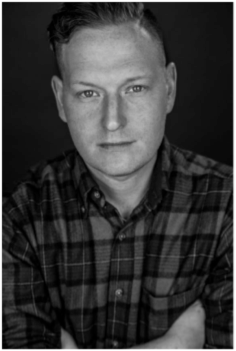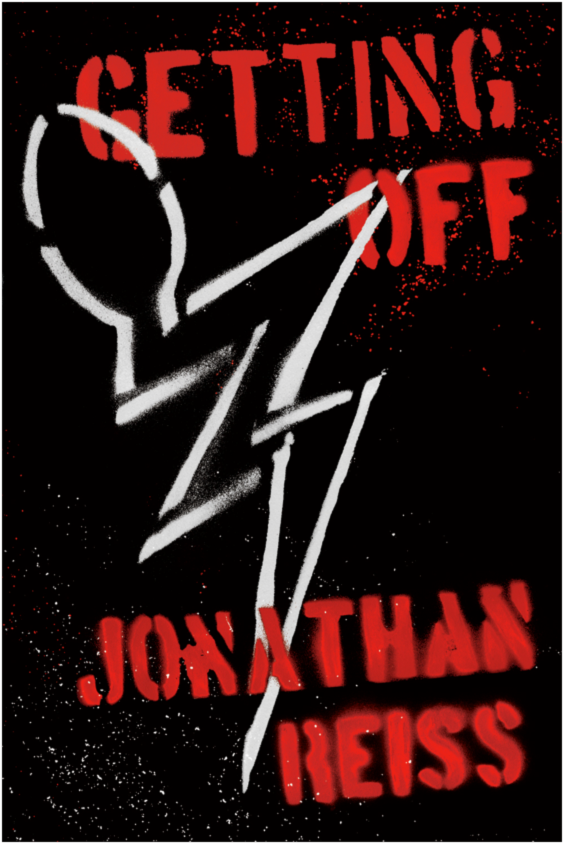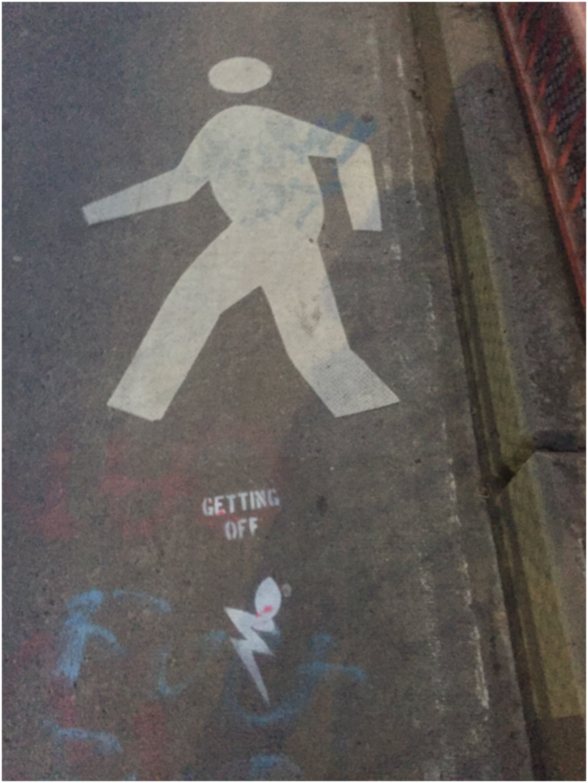September 1, 2017
Introducing Jonathan Reiss—A Writer for a New Century
Getting Off—
Book Review and Author Interview by: Jennifer Parker
The book Getting Off is the fictional story of a young heroin addict who is betwixt and between what remains of his upper-middle class background and the likelihood of overdosing on drugs, becoming homeless or dying in a stranger’s apartment. It’s a sort of introspective social comedy, in which an entire subculture is artfully represented by one individual. You sense that Jonathan Reiss knows the territory intimately; that he knows what it’s like to live in a constant state of knowing he can do better yet blaming only himself. At the same time, Reiss managed to dodge writing just another addiction book—somehow avoiding the proclivity of Gen–X writers before him to write novels with characters that are hyperbolic to the point of being cartoonish like in Irvine Welsh’s trilogy, Skagboys or Less Than Zero by Bret Eason Ellis. Don’t get me wrong, I love Welsh and Ellis but what I love is their writing, the playful use of language, the actual story telling—less so the characters. Ultimately what makes a good story teller is a writer who can dare the reader to put the book down and she won’t even know it. Suddenly, it’s two–o’clock in the morning, the reader doesn’t give a rat’s ass about heroin, doesn’t have insomnia, falls solidly into the territory of Gen–X and can’t put the damn book down. Pure and simple, Getting Off is a heart shattering literary high.
INTERVIEW HIGHLIGHTS
 On good writing versus good storytelling and the ability to reach the reader.
On good writing versus good storytelling and the ability to reach the reader.
Frankly, that's among my favorite pieces of feedback about the book. It speaks to two compelling issues for me, the first being the questions of good writing vs. good storytelling. I'm interested in the divide, particularly in fiction. I think the best craftspeople when it comes to prose do so somewhat slyly, Sam Lipstyte writes beautiful sentences but you can read a book of his and the story is strong enough that you might not really notice because the story is so strong. I guess that's what I always wanted and it's something that became more important to me as time went on. Then again, that's somewhat paradoxical in a way that's similar to music. There are so many great bands that wrote this fantastic record when they practically teenagers and never managed to come up with anything as well-received as that first one despite the fact that they continued to become better musicians and learn more about songwriting. I think the same thing happens with writers to an extent. There's that gut connected natural way you tell a story that is often more powerful than anything else. I wrote this book over time so my hope is that it's a marriage of experience and raw instinctive storytelling.
The thing that I really appreciate is that you related to the characters' struggle. Burroughs once said that he used heroin in order to shave. Like, it was that simple to him. Sure, most might see heroin as an extreme but to anyone who's had a habit, it starts to feel no different than any other thing that we stuff into the void. Heroin is an extreme, sure but I think there's a lot to learn from extremes. You go into the woods with all the other coming of age boys and you almost get eaten by a wolf and starve to death and you come back days after everyone else has already returned. You don't have to do that but if you feel compelled to, you should because you'll learn a lot from it and when you get back you learn how to cast spells. As humans, I think we're predisposed to struggle. I think not struggling makes you sick, makes you weak. I think for a large portion of our lives, the great test is to see what we do with our struggles, whether we overcome and learn, or maintain or crumble and I think people will never tire of reading about people going through that.
On tackling different stages of Simon’s addiction
I tried to represent a divide in the writing in terms of on and off heroin. In acting, one of the hardest lessons is learning to act drunk because it's really easy to overdo it, to indicate as it were. With heroin, what you get is quite similar to normal, day to day living minus the static, minus the mood swings and general aches and pains, except there's also sickness wherein introspection come in bursts along with physical and emotional pain and fear. That's why, if you not familiar with the drug, and you've got a loved one struggling with heroin, you'd be more likely to think they're using when they're sick and withdrawing then when they're actually high. Getting off heroin however, is fascinating. Beyond the initial withdrawals there are these intense moments of euphoria, along with misery, sadness and pain in hurricane-like bursts. There's intense crying you should have done at your grandmother’s funeral while watching a GEICO commercial. There's smelling a passerby’s perfume and getting an erection so all–encompassing you feel like your teeth are falling out, and there are days where the smell of the wind is so overwhelming you can hardly breathe. I wanted to represent that. I felt like it's the part a lot of writers had skipped and yet it was the richest from a storytelling standpoint.
On the blurred lines between memoir and cross-genre fiction and the impact on the writer
I feel pretty strongly that a big part of writer’s job to figure out when to delineate from the truth, I think the best way to learn how to write is to learn how to write about what's true and then go from there. I've learned that you're usually going to get the best stuff from your own experience whether you actually walked on that street or you just obsessed over the geography. You can always find the starting place or the turning point of a story in your experience, which is rad because it gives you an excuse as a person to experience all kinds of shit. Even as a journalist I used the job title as an excuse to do all kinds of things whether it was to have a conversation with someone whose brain I'd always wanted to pick or go to a porn convention or just show up to an event alone. All my favorite writers, the ones that made me want to start writing were so-called "fiction writers" but there was no question that William Lee was Burroughs and Henry Chinaksi was Bukowski, and Miller, and Fante and Bowles, and Crews and so on and so forth. Our obsession with truth is fine on a certain level, it's natural and healthy and I think it's a gift to the reader to let them wonder about what is true, but in cases like JT Leroy or even James Frey, the idea of it being a matter of legality I found distasteful. I thought Laura Albert displayed at the very least an amazing ability to build fascinating characters and worlds, and I think it's absurd that character JT Leroy was more heralded than she is. Prince used to not let recorders in the room when journalists interviewed him. It gave him the ability to deny he said anything he didn't like but it also gave the writer's license turn him into a story. I think we all have a very natural inclination to want to make real life feel more like stories. I'm perfectly okay with readers assuming that this whole novel is true, and I'm also fine with them assuming it's completely made up but the best version is something in between.

On not wanting to write just another addiction book and the initial impetus for writing the novel
The majority of what I read is what I guess would be described as "Literary Fiction" whatever that means, at this point it's kind of like calling something, "Punk Rock.” One of the jobs I took during the past decade of writing this book was covering hip hop for various magazines. I remember going out to eat cheesesteaks in Philly with a bunch of rappers and one of them asking me what kind of a book I was working on. He told me he was working on a book too, so I told him I was writing fiction and his response was, "Like dragons and stuff?" The point being, most people don't think On the Road anymore when they think “fiction.”
I'd say though that of the literary fiction books I liked there was often a fantastical element to many of them. In Geek Love, there are people cutting off their limbs. Jennifer Belle has a book with elephants stomping around Manhattan. So, I wanted some of that in the book. I suppose I thought that we lived in an era where heroin addiction could be the backdrop for a novel rather than the novel itself. In a sense, that's what I wanted to write. I think most writers divide our lives into sections, often it works out to decade by decade that turn into novels. The simple answer is I wanted to write my first novel.
On Current Projects
Most of my time is spent doing scripted stuff right now. I have some TV things not related to the novel. I've been doing less journalism lately but I'm still doing pieces when they find me. I have the bones for second novel about a Jewish journalist. I worked as a journalist for most of the time that I was writing this book. I'd been fairly alienated from Judaism for a long time, and then suddenly I found myself writing for these Jewish–themed outlets about Jewish topics which brought me back to Judaism in a way that I hadn't anticipated. I'd had a rocky relationship with my religion. I did a piece for a podcast called The Soundtrack Series which was a Moth–type story series with stories that revolved around songs, I wrote a piece about selling one of my Bar Mitzvah gifts to get my first tattoo when I was 13, but it was mostly about grandfather who was a Holocaust survivor. So, I think the book will grow from that seed. Being a journalist in this day and age is also an interesting thing to look into, my experience with it has been at least. I'd love to talk more about the TV stuff, hopefully soon I'll be able to. Oh, I also take care of people's dogs when they go out of town.
About changes in your life between beginning the novel and publishing it mean, how much do things change in between your 20's and 30's?
I stopped worrying so much about success. For what it's worth I feel about as successful as I've felt now that I've stopped worrying. My relationship with my parents grew strong in a way that I would never have anticipated. I went to community college for a year before going off to college full time and that's really when I started writing. I had a teacher who pulled me aside at the end of the semester and said, "You can do this if it's something you're interested in. But you should know that it's going to take a long time and the best advice I can give you is to just stick around, because that's the difference between the people that succeed in this and the people that don't, sticking around." I guess I hung in through enough moments of doubt and tests of faith, grew a little thicker skin.
About generating buzz for Getting Off
I played in a few punk bands in high school and always enjoyed the DIY marketing process, so I’d always wanted to approach getting the word out for the book almost like it was a band. The cover of the book looks like a logo (it’s also a magic sigil) and so the hope was people would spread it around in one way or another.
About the sidewalk graffiti on the streets of Brooklyn
Regarding the graffiti, obviously neither myself nor anyone involved with the publication of the book is responsible for the Getting Off logos on the sidewalks in Brooklyn, but I also can’t claim not to love the fact that they exist. They brighten my day every time I pass one or see a photo of one.

On the other hand, I’m extremely irked by some of the other sidewalk graffiti I see. Justin Bieber, Demi Lovato and Ben Harper all hire people to spray paint their ads all over the place. On the way to work today I saw a huge Killers tag covering one of the more well–placed Getting Off tags. I find that pretty distasteful in general for any one person to cover another person’s tag but The Killers have thousands upon thousands of dollars to spend on advertising. So, I’d like to take this opportunity to tell Brandon Flowers, Ben Harper, Demo Lovato and Justin Bieber to go fuck themselves. And to the person responsible for the Getting Off tags - may the force be with you.
We have something else interesting in the works when it comes to getting the word out but it’s currently hush hush.
On heroin bags as a marketing tool (contains a USB stick of the novel)
Most people don’t know what a bag of heroin looks like. They come in glassine bags that are used for few other purposes aside from heroin namely stamp collecting and they are all stamped with rubber ink stamps that have logos like “Gucci” or “Death Sentence.” The stamps are sometimes funny, sometimes topical and often ominous. All of this is discussed in the book and I’ve actually written a few newspaper pieces about the underground heroin stamp world. In fact, when Jeanne Thornton from Instar Books went to the stamp shop to get the stamp made for the eBooks there was a big sign warning customers not to use their stamps for heroin.

Basically, I always wanted to write a first novel that was a quick read. A lot of the early responses to the novel or at least the ones that made me most giddy were these visceral reactions; a friend of mine told me he fainted at work during The Suicide Vein section. In the extended version of Scott McClanahan’s quote about the book he implores the reader to “Just put it in your veins!” So, the idea of packaging it like a drug seem to jibe. More so than anything I think Miracle Jones from Instar got a kick of the idea of selling eBooks via quick hand to hand transactions in bars so he could let his inner “Marlo Stanfield” out. Jeanne and Miracle from Instar are two brilliant talents. Their imagination and experience resulted in the finished package of this thing being something that makes me really proud. If I were a writer looking for a home for a manuscript, I’d be all over Instar right now. I’m really excited to see what they do next.
On a possible film adaptation
There's some chatting going on to that end. I was taught to write novels as just a collection of scenes, so there was always a film version of the book in my head. Also, my sister is a casting director so we're always talk about who would play who in the book. The book being a thing is still very new right now. Since we're an independent outfit we're kind of taking it one step at a time. We just feel fortunate that it's received the attention it’s received. That said, I'd love to see what a really capable actor could do with Simon.
On what you want people to take away from your novel
All I ever really want is to give people permission to feel feelings, either the ones they need to feel or the ones they don't usually get to. I want them to have a moment of intimacy with someone they wouldn't usually. I guess what I'm saying is I want the reader to want to go hug a junkie.
